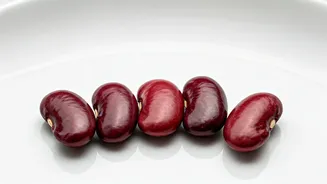Kidney Health Explained
The kidneys are vital organs, functioning as the body's primary filtration system. They eliminate waste products and excess fluids, helping maintain the balance
of electrolytes and blood pressure. Furthermore, they are crucial for producing hormones that control blood pressure, red blood cell production, and calcium metabolism. When the kidneys aren't functioning properly, the body retains waste, leading to a host of health issues. Therefore, supporting kidney function through diet and lifestyle choices is paramount to overall health. Incorporating specific foods known for their detoxifying properties can significantly contribute to maintaining healthy kidneys. This proactive approach helps reduce strain on these vital organs, promoting their long-term health and efficiency.
The Power of Cranberries
Cranberries are renowned for their effectiveness in preventing urinary tract infections (UTIs), directly benefiting the kidneys. This is mainly due to their high content of proanthocyanidins, which prevent bacteria from adhering to the urinary tract walls. Besides preventing UTIs, cranberries offer antioxidant properties that combat free radicals, protecting the kidneys from oxidative stress. Regular cranberry consumption, in the form of juice or whole cranberries, can help reduce the risk of kidney infections and support overall urinary health. However, it's important to consume cranberry products in moderation, as excessive intake, especially of sweetened juice, might lead to increased sugar consumption.
Benefits of Red Bell Peppers
Red bell peppers are rich in antioxidants, particularly vitamin C, which acts as a potent protector against kidney damage. They are also low in potassium, making them a suitable option for individuals with kidney issues who need to manage their potassium intake. The antioxidants found in red bell peppers help neutralize harmful free radicals, which can contribute to kidney disease and dysfunction. Furthermore, these peppers provide essential vitamins like vitamin A and vitamin B6, enhancing overall kidney health. Including red bell peppers in your diet, either raw in salads or cooked in various dishes, is an easy way to boost your intake of kidney-friendly nutrients. The versatile nature of red bell peppers allows them to be incorporated into numerous meals, making it simple to support your kidney health.
Garlic's Kidney-Friendly Properties
Garlic has long been celebrated for its numerous health benefits, and its positive impact on kidney health is noteworthy. It is a natural anti-inflammatory agent and provides antioxidant support. Garlic's compounds help to reduce inflammation and oxidative stress, which are major factors contributing to kidney damage and the progression of kidney disease. Moreover, garlic acts as a natural diuretic, aiding in the removal of excess fluids and waste products from the body, thus relieving some of the kidneys' workload. Garlic's use can be incorporated by adding it to almost any savory dish. It is an easy way to incorporate the benefits of garlic into your diet.
The Role of Cauliflower
Cauliflower, like red bell peppers, is a low-potassium vegetable, making it an excellent choice for individuals on kidney-friendly diets. It is packed with vitamin C, vitamin K, and folate. These nutrients help maintain kidney function by fighting oxidative stress and reducing inflammation. In addition to its low potassium content, cauliflower is a good source of fiber, which helps in the elimination of waste products, supporting the kidneys' detoxification process. Cauliflower can be prepared in various ways: roasted, steamed, or added to soups and salads, making it a versatile addition to any diet. Its mild flavor makes it easily adaptable to many recipes, ensuring a simple way to protect and nurture your kidneys.























